- Home
- Amy Harmon
What the Wind Knows Page 2
What the Wind Knows Read online
Page 2
“Yes. There is,” Eoin whispered. He closed his eyes, his mouth quivering. “A wonderful story. I can’t look at you without remembering.”
“That’s a good thing, isn’t it?” I asked. “Remembering is good.”
“Remembering is good,” he agreed, but the words came out with a grimace, and he clutched at the covers.
“When was the last time you took a pain pill?” I asked, my voice sharp. I dropped the pictures and rushed to the pills stacked on his bathroom counter. I shook one out with anxious hands and filled a glass of water, then lifted Eoin’s head to help him drink it down. I’d wanted him to be in a hospital, surrounded by people who could take care of him. He’d wanted to be home with me. He’d spent his life in hospitals, caring for the sick and dying. When he was diagnosed with cancer six months ago, he’d calmly announced he would not be receiving treatment. His only concession to my tearful ranting and cajoling was that he would manage his pain.
“You need to go back, Annie lass,” he said a while later, the pill making his voice dreamlike and soft.
“Where?” I asked, heavyhearted.
“To Ireland.”
“Go back? Eoin, I’ve never been. Remember?”
“I need to go back too. Will you take me?” he slurred.
“I’ve been wanting to go to Ireland with you all my life,” I whispered. “You know that. When should we go?”
“When I die, you’ll take me back.”
The pain in my chest was a physical thing, biting and twisting, and I bore down to combat it, to extinguish it, but it grew like Medusa’s hair, the writhing tendrils slipping up and out of my eyes in hot, wet rivulets.
“Don’t cry, Annie,” Eoin said, his voice so weak that I did my best to quell the tears, if only to save him from distress. “There is no end to us. When I die, take my ashes back to Ireland and set me loose in the middle of Lough Gill.”
“Ashes? In the middle of a lake?” I asked, trying to smile. “Don’t you want to be buried near a church?”
“The church just wants my money, but I hope God will take my soul. What’s left of me belongs in Ireland.”
The windows rattled, and I rose to pull the drapes. Rain beat against the panes, a late spring storm that had been threatening the East Coast all week.
“The wind is howling like the hound of Culann,” Eoin murmured.
“I love that story,” I said, sitting back down beside him. His eyes were closed, but he continued to speak, softly musing like he was remembering.
“You told me the story of Cú Chulainn, Annie. I was afraid, and you let me sleep in your bed. Doc kept watch all night long. I could hear the hound in the wind.”
“Eoin, I didn’t tell you the story of Cú Chulainn. You told me. So many times. You told me,” I corrected him, straightening his blankets. He clutched at my hand.
“Yes. I told you. You told me. And you will tell me again. Only the wind knows which truly comes first.”
He drifted off, and I held his hand, listening to the storm, lost in memories of us. I was six years old when Eoin became my anchor and my caretaker. He’d held me while I wept for parents who weren’t coming back. I wished desperately that he could hold me again, that we could start over, if only to have him with me for another lifetime.
“How will I live without you, Eoin?” I mourned aloud.
“You don’t need me anymore. You’re all grown up,” he murmured, surprising me. I’d thought he was fast asleep.
“I’ll always need you,” I cried, and his lips trembled again, acknowledging the devotion that underscored my words.
“We’ll be together again, Annie.” Eoin had never been religious, and his words surprised me. He’d been raised by a devout Catholic grandmother but left the religion behind when he left Ireland at eighteen. He’d insisted I attend a Catholic school in Brooklyn, but that was the extent of my religious upbringing.
“Do you really believe that?” I whispered.
“I know it,” he said, opening his heavy eyelids and regarding me solemnly.
“I don’t. I don’t know it. I love you so much, and I’m not ready to let you go.” I was crying in earnest, already feeling his loss, my loneliness, and the years that stretched before me without him.
“You’re beautiful. Smart. Rich.” He laughed weakly. “And you did it all by yourself. You and your stories. I’m so proud of you, Annie lass. So proud. But you don’t have a life beyond your books. You don’t have love.” His eyes clouded and searched the space beyond my head. “Not yet. Promise me you’ll go back, Annie.”
“I promise.”
After that he slept, but I could not. I stayed by his side, hungry for his presence, for the words he might say, for the comfort I’d always drawn from him. He awoke once more, panting from the pain, and I helped him swallow another pill.
“Please. Please, Annie. You must go back. I need you so badly. We both do.”
“What are you talking about, Eoin? I’m right here. Who needs me?”
He was delirious, floating in pain, beyond sentience, and I could only hold his hand and pretend I understood.
“Sleep now, Eoin. The pain will be easier to bear.”
“Don’t forget to read the book. He loved you. He loved you so much. He’s been waiting, Annie.”
“Who, Eoin?” I couldn’t hold back the tears, and they dripped on our clasped hands.
“I miss him. It’s been so long.” He sighed deeply, his eyes never opening. What he saw was in his memory, in his pain, and I let him ramble until the mumbled words became shallow breaths and restless dreams.
The night ended, and a day dawned, but Eoin didn’t wake again.
2 May 1916
He’s dead. Declan is dead. Dublin is in ruins, Seán Mac Diarmada is in Kilmainham Gaol awaiting the firing squad, and I don’t know what’s become of Anne. Yet here I sit, filling the pages of this book as though it will bring them all back. Every detail is a wound, but they are wounds I feel compelled to reopen, to examine, if only to make sense of it all. And someday, little Eoin will need to know what happened.
I intended to fight. I started Easter Monday with a rifle in my hands that I put down and never picked up again. From the moment we stormed into the General Post Office, I was up to my elbows in blood and chaos in the makeshift first aid post. There was very little organization and a great deal of excitement, and for the first few days, no one knew what to do. But I knew how to bind wounds and staunch blood flow. I knew how to make a splint and dig out a bullet. For five days, under constant shelling, that’s what I did.
I moved through the days in a dream, never resting, so tired I could have slept on my feet, my head bobbing in time with the artillery rounds. Through it all, I couldn’t believe it was happening. Declan was euphoric, and Anne was moved to tears when the gunboat started firing on Sackville Street, as if the use of big weapons solidified our dreams of a rebellion. She was sure the British were finally listening. I teetered between pride and despair, between my boyhood dreams of nationalism and Irish rebellion, and the sheer destruction being meted out. I knew it was futile, but I was compelled through friendship or loyalty to take part, even if my part was only to see that the rebels—the whole ragtag, idealistic, fatalistic lot—had someone looking after their wounded.
Declan had made Anne promise to stay out of harm’s way. She, Brigid, and little Eoin were holed up in my house in Mountjoy Square when Declan and I joined the Volunteers marching through the streets, intent on carrying out our revolution. Anne joined Declan in the GPO on Wednesday, kicking in a window and climbing over the jagged edge to reach him. She hadn’t even noticed the blood streaming from a slice on her left leg and palm from the broken glass until I made her sit so I could tend to it. She told Declan that if he was going to die, she was going to die with him. Rage and threaten as he would, she turned a deaf ear and made herself useful playing messenger between the GPO and Jacob’s factory, since no one would give her a gun. The women were much more able to move about without
being questioned or fired upon. I don’t know when her luck gave out. The last time I saw her was early Friday morning, when the flames creeping down both sides of Abbey Street made abandoning the post office unavoidable.
I had started evacuating the wounded to Jervis Street Hospital with a stretcher I’d begged off a St. John Ambulance worker. He gave me three Red Cross armlets as well so that we wouldn’t be fired upon—or stopped—as we moved south on Henry Street to Jervis and back again. Connolly’s ankle was shattered, but he wouldn’t leave. I left him in the care of Jim Ryan, a medical student who’d been there since Tuesday. I made the trip three times before darkness fell and barricades prevented two Volunteers—boys from Cork who’d come to Dublin to join the fight—and me from returning. I told the boys to get out of the city. To start walking. The rebellion was over, and they were needed at home. Then I went back to the Jervis Street Hospital and found an empty corner, folded my coat beneath my head, and collapsed, only to be awakened by a nurse, who was certain that the hospital was going to be evacuated due to the flames that had followed me from the GPO. I went back to sleep, too spent to care. When I awoke, the fire had been contained, and the rebel forces had surrendered.
The staff at Jervis Street Hospital told the British soldiers that I was a surgeon when they came to round up the insurgents, and miraculously I wasn’t detained. Instead, I spent the rest of the day attending to the dead and dying on Moore Street, where forty men had tried to secure a line of retreat from the burning GPO. Civilians and rebels alike had been mowed down by Crown forces. Women, children, and old men had been caught in the crossfire, and their dead faces were covered in soot. Flies buzzed round their heads, some of them burned beyond recognition. In my heart of hearts, I could not divorce myself from some of the blame. It is one thing to fight for freedom; it is another to condemn the innocent to die in your war.
That is where I found Declan.
I said his name, ran my hands down his blackened cheeks, and he opened his eyes to my voice. My heart leapt. I thought for a minute I might be able to save him.
“You’ll take care of Eoin, won’t you, Thomas? You’ll take care of Eoin and my mother. And Anne. Look after Anne.”
“Where is she, Declan? Where’s Anne?”
But then his eyes closed, and his breath rattled in his throat. I lifted him up, over my shoulder, and ran for help. He was gone. I knew it, but I carried him to the Jervis Street Hospital, demanded a place to lay him down, and washed the blood and grit from his skin and hair and straightened his clothes. I bandaged his wounds, which would never heal, and then I carried him through the streets again, up Jervis, across Parnell, through Gardiner Row, and into Mountjoy Square. Nobody stopped me. I carried a dead man on my shoulders through the centre of town, and the people were so shell-shocked, they looked the other way.
I don’t think Declan’s mother, Brigid, will ever recover. The only person who might love Declan more than Anne is Brigid. I am taking him home to Dromahair. Brigid wants to bury him in Ballinagar, beside his father. And then I’ll come back to Dublin for Anne. God forgive me for leaving her behind.
T. S.
2
THE LAKE ISLE OF INNISFREE
I will arise and go now, for always night and day
I hear lake water lapping, with low sounds by the shore;
While I stand on the roadway, or on the pavements grey,
I hear it in the deep heart’s core.
—W. B. Yeats
I flew into Dublin, smuggling the urn of Eoin’s ashes in my suitcase. I had no idea if there were international laws—or Irish laws—about transporting the dead and decided I didn’t want to know. My suitcase was waiting for me at the baggage claim, and I double-checked to make sure the urn hadn’t been confiscated before renting a car to drive northwest to Sligo, where I would stay for a few days while I explored nearby Dromahair. I hadn’t adequately prepared myself to drive on the wrong side of the road and spent much of the three-hour journey to Sligo weaving across the road and screaming in terror, unable to enjoy the landscape for fear I would miss a sign or hit an oncoming car.
I rarely drove in Manhattan; there was no reason to own a car. But Eoin had insisted I learn how and get a driver’s license. He said freedom was the ability to go wherever your heart called, and growing up, we’d driven up and down the East Coast on little vacations and adventures. The summer I turned sixteen, we spent July crossing the entire United States, starting in Brooklyn and ending in Los Angeles. That is when I learned to drive, traversing long stretches of highway between small towns that I would never see again. Over rolling hills, through the red cliffs of the West, across the expanse of nothing and everything with Eoin at my side.
I’d memorized “Baile and Aillinn” by Yeats as we drove, a narrative poem filled with legend and longing, death and trickery, and love that transcended life. Eoin had held the dog-eared copy of Yeats’s poetry, listening to me stumble through lines, gently correcting me, and helping me pronounce the Gaelic names of the old legends until I could deliver each line and verse like I had lived it. I had a passion for Yeats, who was obsessed with the actress Maud Gonne, who gave her love to a revolutionary instead. Eoin let me ramble on about things I thought I understood—but only romanticized—like philosophy and politics and Irish nationalism. Someday, I told him, I wanted to write a novel set in Ireland during the Rising of 1916.
“Tragedy makes for great stories, but I’d much rather your story—the one you live, not the ones you write—be filled with joy. Don’t revel in tragedy, Annie. Rejoice in love. And once you find it, don’t let it go. In the end, it is the one thing you won’t regret,” Eoin had said.
I was not interested in love beyond what I could read on a page. I spent the next year pestering Eoin to take me to Ireland, to Dromahair, the little town where he’d been born. I wanted to attend the Yeats festival in Sligo, which Eoin said wasn’t far from Dromahair, and perfect my Gaelic. Eoin had insisted I learn, and it was the language of us, of our life together.
Eoin had refused. It was one of the few times we fought. I spoke in a bad Irish accent for two months to torture him.
“You’re tryin’ too hard, Annie. If you have to think about the way your tongue is movin’ in your mouth, then it doesn’t sound natural,” he’d coached, wincing.
I redoubled my efforts. I was relentless in my fixation. I wanted to go to Ireland. I went so far as to call a travel agent to help me. Then I presented the arrangements, complete with dates and pricing options, to Eoin.
“We’re not going to Ireland, Annie. It’s not time. Not yet,” he said, a stubborn set to his chin, rejecting my travel brochures and itineraries.
“When will it be time?” I wheedled.
“When you’ve grown.”
“What? But I’m grown now,” I insisted, still holding on to the accent.
“See there? That was perfect. Natural. No one would know you’re an American,” he said, attempting to distract me.
“Eoin. Please. It’s calling me,” I moaned theatrically, but I was sincere in my fascination. It did call to me. I dreamed about it. I yearned for it.
“I believe that, Annie. I believe it is. But we can’t go back yet. What if we go and we never come back?”
The thought had filled me with wonder. “Then we’ll stay! Ireland needs doctors. Why not? I could go to college in Dublin!”
“Our life is here now,” Eoin argued. “The time will come. But not now, Annie.”
“Then we’ll just visit. Just a trip, Eoin. And when it’s over, no matter how much I love it and want to stay, we’ll come home.” I thought I was being so reasonable, and his adamancy confused me.
“Ireland is not safe, Annie!” he said, losing his temper. The tips of his ears were red, and his eyes flashed. “We’re not going. Jaysus, Mary, and Joseph, girl. Let it go.”
His anger was worse than a slap, and I ran to my room and slammed the door, crying and raging and making childish plans to run away.
<
br /> But he never yielded, and I was not a rebellious child; he’d never given me anything to rebel against. He didn’t want to go to Ireland—didn’t want me to go to Ireland—and out of love and respect for him, I eventually gave up. If his memories of Ireland hurt him so deeply, then how could I insist he return? I threw away the brochures, retired my Irish accent, and read Yeats only when I was alone. We kept up the Gaelic, but Gaelic didn’t make me think of Ireland. It made me think of Eoin, and Eoin had urged me to pursue other dreams.
I began to write my own stories. To craft my own tales. I wrote a novel set during the time of the Salem witch trials—a young-adult book that I’d sold to a publisher at eighteen—and Eoin had spent two weeks with me in Salem, Massachusetts, letting me research to my heart’s content. I wrote a novel about the French Revolution through the eyes of Marie Antoinette’s young lady-in-waiting. Eoin happily arranged his schedule, reassigned his patients, and took me to France. We’d been to Australia so I could write a story about the English prisoners who’d been sent there. We’d been to Italy, to Rome, so I could write a tale about a young soldier during the fall of the Roman Empire. We’d been to Japan, the Philippines, and Alaska, all in the name of research.
But we had never gone to Ireland.
I’ve gone on dozens of trips by myself. I’ve spent the last decade of my life absorbed in my work, crafting one story after another, traveling from one location to the next to research and write. I could have gone to Ireland alone. But I never did. The time never seemed right, and there were always other stories to tell. I’d been waiting for Eoin, and now Eoin was gone. Eoin was gone, and I was finally in Ireland, driving on the wrong side of the road, with Eoin’s ghost in my head and his ashes in the trunk.
The anger I’d felt as a sixteen-year-old girl—the injustice and confusion at his refusal—reared in my chest again.
“Damn you, Eoin. You should be here with me!” I cried, pounding on the wheel, my eyes filling with tears, causing me to narrowly miss plowing into a truck that swerved and blared its horn in warning.

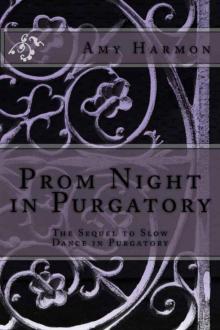 Prom Night in Purgatory
Prom Night in Purgatory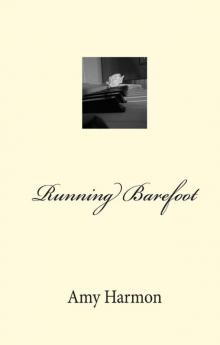 Running Barefoot
Running Barefoot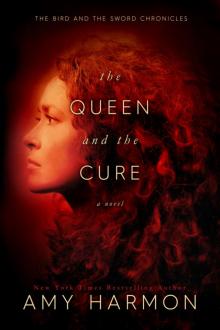 The Queen and the Cure
The Queen and the Cure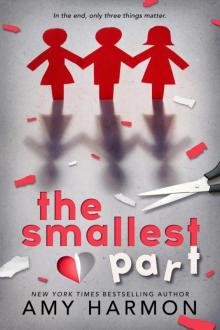 The Smallest Part
The Smallest Part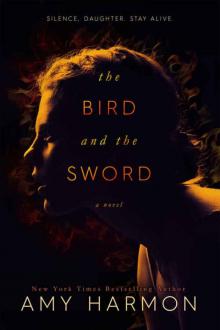 The Bird and the Sword
The Bird and the Sword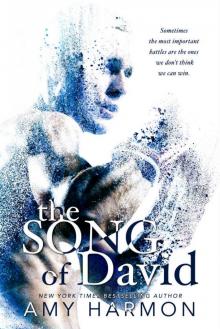 The Song of David
The Song of David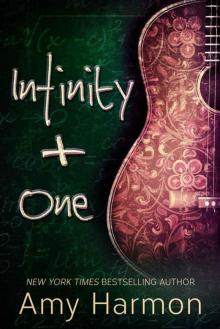 Infinity + One
Infinity + One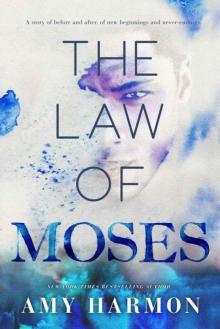 The Law of Moses
The Law of Moses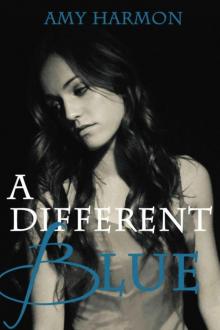 A Different Blue
A Different Blue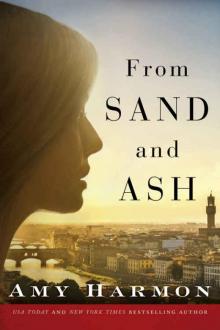 From Sand and Ash
From Sand and Ash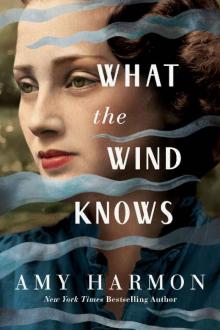 What the Wind Knows
What the Wind Knows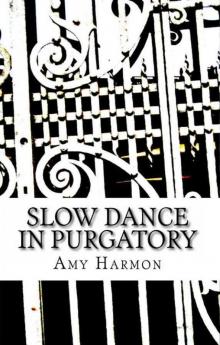 Slow Dance in Purgatory
Slow Dance in Purgatory Romance Through the Ages
Romance Through the Ages